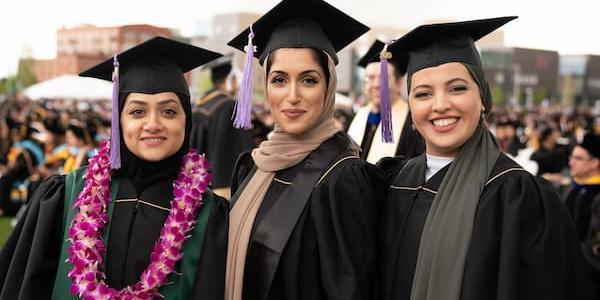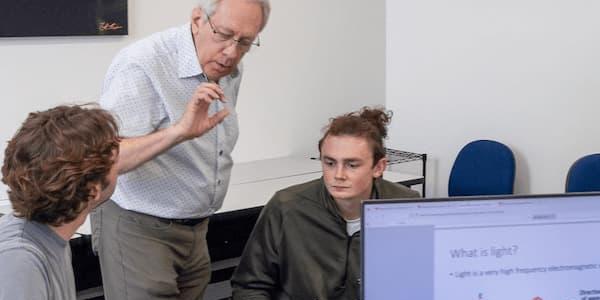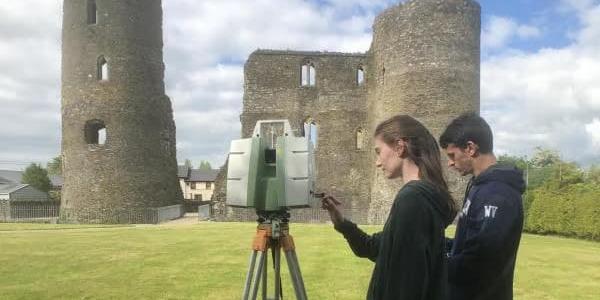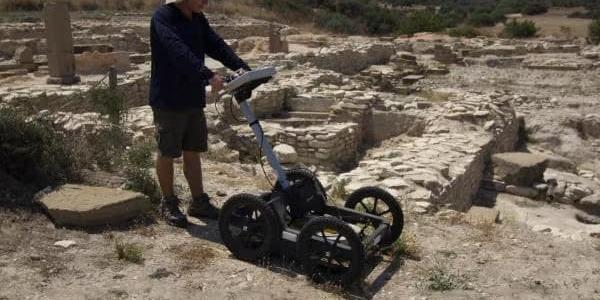Committed To Providing Substantive Research Experiences for Our Students
Credit hours: 120
Full-time, part-time
On-campus and online courses
5, 8, 16 week formats available
Start terms: fall, spring, summer
The realm of physics has expanded over the years into the other sciences giving rise to areas such as biophysics, astrophysics, geophysics, psychophysics, chemical physics, mathematical physics, etc.
The Physics Department offers a Bachelor of Science in physics, as well as minors in physics, biophysics, and astrophysics.
A physics degree can lead to post-graduate study or employment with opportunities to advance knowledge, innovate new products and processes, and achieve far-reaching impact in both local and international communities.
The minor in biophysics enables students with primary interests in biology, chemistry, health sciences, mathematics, anthropology, psychology, or other disciplines to explore the deep connections between fundamental physical processes and the functions and development of life.
Astrophysics is an important and well-represented sub-discipline in physics. It includes the study of the solar system, galactic and extragalactic astrophysics, as well as cosmology.
The University of Colorado Denver Physics Department is committed to providing a unique education in physics, a science that is important for all of the natural sciences and for a wide range of technologies.
Professional Development Seminars
Introduction to the physics program for all beginning physics majors or those considering the major. Discussions about career opportunities, the various physics undergraduate and graduate degree paths, research being conducted within the physics department, and strategies for being a successful and engaged physics major.
In the CU Denver Physics Department, our faculty are deeply committed to hands-on learning, blending real-world applications into teaching and research. By integrating physics into everyday scenarios, you gain a robust, practical understanding of the subject, preparing you for diverse and exciting career opportunities.
The department’s focus on your undergraduate education ensures an exceptional experience. Because we do not offer graduate-level degrees, our undergraduates benefit from unique advantages, such as early and unrestricted access to laboratory course credits. This means no competition with graduate students during registration, allowing physics majors to progress more efficiently through their studies.
The results speak for themselves: 95% of our physics majors successfully graduate, a testament to the department’s commitment to their success. Our Professional Development Seminars further prepare you for life after graduation, equipping you with the skills and knowledge needed to excel in your chosen fields.
CU Denver’s Physics Department also reflects the diversity and modernity of today’s student. Forty percent of our physics majors identify as female, double the national average of 20%. Additionally, the department welcomes a broad array of students, including Hispanic students and military veterans, fostering an inclusive and supportive environment for all.
Outside the classroom, you will thrive in a vibrant and active physics community. Our student-led Physics Club welcomes you into a space for collaboration, exploration, and the pursuit of shared interests, enriching the academic experience and building lasting connections.
With experienced faculty, a supportive environment, and a forward-thinking approach to education, the Department of Physics at CU Denver is uniquely positioned to prepare you for success in a world shaped by physics. Whether you pursue careers in science, industry, or beyond, you will graduate ready to make an impact.
Careers with your Physics degree
Alumni Highlight
Erik designed, built, and operates Google’s Quantum AI campus in Santa Barbara—with the mission to build an error corrected quantum computer for the world to enable humankind to solve problems that would otherwise be impossible. He is one of the scientists on the Google Quantum AI team who demonstrated humanity’s first beyond-classical computation (Nature 2019), recognized as one of the Breakthroughs of the Year.
Eric Lucero, 2005
A major in physics is one of the few academic paths that equips you for a wide array of professions, including roles such as computer analyst, engineer, technical writer, industrial marketer, doctor, or lawyer.
- Electrical Engineer
- Mechanical Engineer
- Technical Writer
- Science Teacher
- Forensic Scientist
- Professor
- Data and Research Analysts
- Web Developer
- Systems Analyst
- Meteorologist
- Application Developer
- Data Scientist
Companies some of our graduates have joined
- Syntax
- Lucid Motors
- Summit Engineering
- University of Colorado Denver
- Lockheed Martin
- National Renewable Energy Laboratory
- US Army
- University of Colorado Anschutz Medical Campus
- National Institute of Standards and Technology
- Laboratory for Atmospheric and Space Physics
- Johns Hopkins University Applied Physics Laboratory
- Raytheon
Physics Capstone Project
A one-semester intensive physics capstone project in experimental or computational physics. Projects may include (A) development of a new or enhanced experiment for PHYS 3711, (B) further independent investigation in one of the fundamental areas of physics, or (C) development of a technical innovation for society and industry
The realm of physics has expanded over the years into the other sciences giving rise to areas such as biophysics, astrophysics, geophysics, psychophysics, chemical physics, mathematical physics, etc. Each of these areas has its individual frontier of basic research, while traditional physics has continued to pursue its own fundamental questions.
Majoring in Physics: 47+ hours
The Physics program is designed with a “spiral curriculum” approach, ensuring you build a strong foundation while revisiting and deepening your understanding of core concepts throughout your academic journey. Topics Include:
- Fundamental physics and mathematics
- Mechanics
- Electricity and Magnetism
- Thermodynamics,
- Quantum mechanics
- Vibrations and Waves
- Thermal Physics
What sets physics apart is our commitment to breadth.
This approach addresses a common question from prospective students—how much lab work they will get to do—by integrating experiential learning across the curriculum, ensuring graduates are not only knowledgeable but also skilled in applying their learning in real-world contexts.
Interested in a career in quantum?
At CU Denver, you can learn about quantum in a unique, cross-disciplinary way that brings together world-renowned faculty experts in physics and electrical engineering.
CU Denver’s Quantum Information Technology Certificate prepares you to enter the quantum workforce with collaborative tools to excel in a transformational field.
You’ll take four courses to complete the certificate:
- Quantum Computing
- Quantum Computing Algorithms
- Quantum Computing Technology
- Quantum Technology Systems
CU Denver Core: 34-40 Hours
You’ll be educated in
- English and mathematics
- international and cultural diversity perspectives
- arts and humanities
- behavioral, physical, and social sciences
College of Liberal Arts and Science Graduation Requirements
These courses give you a better understanding of the issues and skills you need to succeed.
Topics include:
- Logic, Language, and Scientific Reasoning
- Psychology
- Writing for the Sciences
- Public Health
Double Majors
You, like many of our students, may be interested in a double major. Common combinations include:
Bachelor of Science - Data Science
Bachelor of Science – Computer Science
Minor in Physics, Astrophysics, or Biophysics
Non-Physics majors can add a minor in Physics, Astrophysics, or Biophysics to your degree by completing at least 18 hours of specified coursework. Topics include:
- General and Applied Physics
- Extragalactic Astrophysics
- Cosmology
- Mechanics
- Electrodynamics
- Statistical Physics
- Quantum physics
You will need to see your CLAS advisor to declare this minor.
Add a Masters in Integrated Sciences to your Bachelor degree in as little as one extra year (4+1)
Save time and tuition while expanding your career opportunities at the same time by enrolling in the Bachelors in Physics + the Masters of Integrated Sciences program. By gaining a Masters in Integrated Sciences, you’ll be able to take courses from a variety of areas in mathematics, while also still taking courses in Physics.
Benefits include
More career opportunities. Some career paths require that job candidates hold advanced degrees. Completing the BA/BS + MA/MS program allows you to apply for higher level positions more quickly, providing an advantage in a competitive job market.
Saves time. Combining the Bachelors and Masters programs allow you to complete your undergraduate and graduate studies quickly, typically within five years instead of six or more.
Cost. A shorter timeline to Masters of Integrated Sciences completion means less tuition, fees, and related educational expenses.
Teaching assistantships. The Department may offer you, as a qualified MA student, research, or teaching assistantships. Combining the BA and MA degrees may allow you to access these opportunities.
Faculty. Combining the BA and MA degrees allows you to continue to take courses at the graduate level from the same familiar, award-winning, and caring faculty members.
Learn more about the CU Denver Master of Science in Integrated Sciences
A. Core Physics Principals and Essential Mathematical Skills: Students will be able understand fundamental laws of physics and a strong mathematical foundation to apply the laws to solve standard problems in physics. Specifically, students will be able to:
- Use the principles of core areas of physics, including classical mechanics, electromagnetism, statistical physics, and quantum mechanics to solve standard physics problems at a level compatible with admission to graduate programs in physics.
- Analyze and interpret qualitative results, both in the core areas of physics and in complex problems that cross multiple discipline areas.
- Apply physical laws to solve new problems.
B. Modeling and Analysis skills: Students will be able to model a problem and evaluate it. Specifically, students will be able to:
- Apply theoretical and computational models to formulate and solve problems in areas outside of the physics core.
- Design experiments to test new ideas.
- Obtain and analyze data from theoretical models and experiments.
- Evaluate the theoretical and experimental results to make sure that they are consistent with existing physical principles.
C. Communication Skills: Students will be able to convey their knowledge and findings effectively and efficiently either individually or in groups to wide varieties of audiences. Specifically, students will be able to:
- Write solution of problems systematically with appropriate mathematical details so that their peers can follow through the steps.
- Write appropriate scientific reports on their research and findings.
- Design and prepare posters and slides appropriate for academics as well as to layperson audiences.
Tuition
The cost of tuition for the Bachelor of Science (BA) in Political Science is different for in-state and out-of-state students. See the link for the current table of rates.
Residents of Western Interstate Commission for Higher Education (WICHE) states may qualify for reduced tuition rates. The Western Undergraduate Exchange (WUE) program requires students to maintain current residency in WICHE state until degree completion.
Scholarships
Each year, CU Denver undergraduate students are awarded over $30 million in scholarships from institutional, local, state, and national sources. Learn more, and apply here.
Other opportunities
Many departments have paid positions (both in the work-study program and outside of it) which may include jobs as graders, teaching assistants, and learning assistants. Please expect to have to apply. Learn more here.
Admission Requirements
If you are an incoming freshman to CU Denver (in-state, out-of-state, and international applicants), you can apply through either the Common Application or the Milo Application. Transfer students will need to submit the Milo Application.
Incoming first-year students
CU Denver requires that students complete the Colorado Higher Education Admission Requirements (HEAR). You will not have to meet all Minimum Academic Preparation Standards (MAPS) for admission, but you will need to complete CU Denver coursework by graduation.
Transfer Students
We have strong connections with other four-year and community colleges. If you have completed more than 24 credits of transferable coursework, you will be evaluated for admission on the basis of your college GPA without regard to your high school performance. If you have fewer than 24 credits, you will be evaluated based on both your high school and college GPAs. For more information and to plan your transfer, see transfer admissions in the admissions office.
If you are in your first or second semester at one of the participating Colorado community colleges and plan to transfer to CU Denver after earning your associate degree, CU Denver Bridge to Bachelors might be a great program for you. To qualify, you must meet the criteria including meeting regularly with your assigned CU transfer advisor while you are attending community college.
International Students
You will need to begin your application through the Office of International Affairs. They will help you manage your application process.
Application deadlines
Spring
Domestic Application: January 1
International Applications: Priority is September 15, and Final is October 15
Summer
Domestic Applications: May 15
International Applications: Priority is January 15, and Final is March 15
Fall
Domestic Applications: August 1
International Applications: Priority is March 15, and Final is May 15
Physics in the news
In the news
- CLAS Mixtape Showcases the Breadth of CU Denver Research
- An NSF Grant Will Support More Learning Assistants on Campus
- Dr. Kathryn Hamilton and Dr. Julien Langou present at the 2025 NSF CSSI PI Meeting
- The Philosophy of Quantum Physics? How This CU Denver Student Bridged Two Worlds
- CU Denver Students are Helping Make Castles More Accessible
- World Quantum Day at CU Denver
- CU Denver’s Quantum Programs Featured in New Report on Preparing the Workforce of Tomorrow from CU Boulder

Making Education Work for All
At CU Denver, making education work for all means breaking down barriers so every learner can succeed. Through inclusive policies, programs, and partnerships, we’re building a culture where opportunity isn’t defined by identity but by ambition and impact. Learn more at our Office of Access and Campus Engagement (ACE)

Find Your Place
Campus can feel like a huge place. We help you find your people by offering the experience of a more traditional, small liberal arts program—for a fraction of the cost. We offer a variety of clubs and networking opportunities.

We Teach Quantum Hands On
Our program provides hands-on experience with instrumentation that also supports quantum sensors and quantum communication—both of which are essential elements for quantum information technology.
—Martin Huber, PhD, Professor, CU Denver Physics Department



